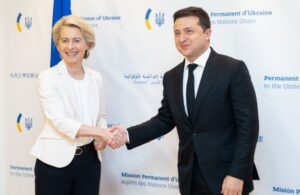
President of Ukraine Volodymyr Zelensky discussed with President of the European Commission Ursula von der Leyen issues of energy security and the development of the security situation around Ukraine, according to the presidential website.
“The head of state informed the interlocutor about the development of the security situation along the borders of Ukraine and in Donbas. The president thanked the head of the European Commission for the consistent support of the sovereignty and territorial integrity of our state, as well as her clear position on the need to tighten EU sanctions in the event of an escalation of Russian aggression against Ukraine. The leaders agreed with the need to continue joint coordinated efforts to prevent the escalation of the conflict,” the President’s Office said on its website.
Zelensky and von der Leyen reportedly discussed challenges for European energy security.
The sides also discussed preparations for holding an international energy business forum in Ukraine, which was agreed upon in November.
The head of state drew attention to the threats to Ukraine and all of Europe that the possible launch of Nord Stream 2 would create. The interlocutors coordinated steps aimed at integrating the unified energy system of Ukraine into the European ENTSO-E network.
Zelensky thanked von der Leyen for the financial support to Ukraine from the European Union and discussed areas for further cooperation.
In addition, the sides paid special attention to the prospects for the liberalization of road freight transport. Zelensky said the conclusion of an agreement on the liberalization of transportation services will help ensure further growth in trade between Ukraine and the EU.

The largest number of flights in the airspace of Ukraine in 2021 among Ukrainian air carriers was performed by Ukraine International Airlines (UIA), the Ukrainian State Air Traffic Services Enterprise (UkSATSE) reported on its Facebook page.
According to the company’s data, SkyUp is in second place. The top five also included Windrose, Azur Air, and Bees Airline.
Among foreign airlines, Turkish Airlines took the first place in the number of flights in 2021. The second is Wizz Air, the third is Ryanair. LOT, Pegasus Airlines, Belavia, Qatar Airways, FlyDubai, Lufthansa and Enter Air followed them.
As reported with reference to UkSATSE, 230,500 flights were performed in the airspace of Ukraine in 2021, which is 62.3% more than in 2020 and 31.2% less than in the pre-crisis 2019.
Ukrainian airlines performed 81,700 flights in 2021 (64.4% more than in 2020 and 25.5% less than in 2019), foreign airlines performed 148,700 flights (61.2% more and 34.1% less respectively).

PrJSC Centravis Production Ukraine, part of Centravis Ltd., intends to invest EUR 10 million in the renewal of production and expansion of capacities in 2022, as well as in improving energy efficiency, while in 2021 it used EUR4 million of investments, Yuriy Atanasov, the CEO of Centravis, said during an online press conference. According to him, capital investments in 2020 amounted to EUR2 million. “For 2021, it was planned to invest EUR 7.5 million, but used EUR 4 million. We implemented several landmark projects – we were able to launch our own boiler houses to provide steam and heat production, thanks to which gas costs halved. We also invested in the renewal of pickling sites – we are leaving from aggressive technologies, plus a reduction in energy costs. Some of the projects have been transferred to 2022. We also intend to invest in additional capacities,” Atanasov explained.
The company in 2021 received income in the amount of EUR140 million, for 2022 the plan is EUR200 million. At the same time, the CEO specified that the growth in income is mainly due to rising prices.
The top manager pointed to three important factors that took place in 2021: a sharp recovery in the market and a “hysterical” increase in demand.
“Markets have moved into a state of activity very quickly since the end of 2020. And it was difficult – we were not ready for this. The second factor – a sharp unwinding of inflation, rising prices for energy resources, for materials, for our raw materials – there was a catastrophically sharp increase in prices. And we had to take this into account in our work. The third factor is how we work to expand our capacities. We did not use an extensive method, we did not increase hiring of personnel, but went along the path of increasing efficiency. And we are directing investments towards systemic expansion of capacities. This determined our actions last year,” the CEO explained.
The head of the enterprise noted that the company is optimistic about 2022 and the future.
“Centravis strengthened its position as a reliable supplier. And the markets are diversified – Europe, Asia, and the Russian market is less and less,” Atanasov stated.
Centravis is one of the world’s largest manufacturers of seamless stainless pipes, founded in 2000. Its production facilities are located in Nikopol (Dnipropetrovsk region). It is included in the top ten global players. The company employs more than 1,400 people.

President of Ukraine Volodymyr Zelensky by decree put into effect the decision of the National Security and Defense Council (NSDC) to impose personal economic sanctions against Russian enterprises and organizations, the presidential press service said. The decision to impose sanctions against Russian enterprises, companies, organizations was made by the NSDC on December 30, 2021. Zelensky on January 21, by decree No.19, put into effect the NSDC decision.
As noted, some 24 enterprises fell under the sanctions. They have the same restrictions. In particular, this is the freezing of assets, the restriction of trade operations, the prevention of the withdrawal of capital from Ukraine, suspension of the fulfillment of economic and financial obligations, cancellation or suspension of licenses and permits, the receipt (availability) of which is a condition for the implementation of a certain type of activity.
The list included such enterprises as JSC Lenpromtransproekt, JSC Insurance Business Group, Gas JSC Industry Insurance Company, JSC Grand Service Express Transport Company, JSC Giproshakht, JSC Russian Institute of Urban Planning and Investment Development “Giprogor,” COOP HIMMELB(L)AU Wolf D. Prix & Partner ZT GmbH, ALARM911 Neva LLC, Geozemstroy LLC, Krymsetenergoproekt LLC, Research Institute of Diagnostics LLC, Research Institute of Perspective Urban Planning LLC, Nivad LLC, SIRIUS Project LLC, Transproekt LLC, Tyus Management Group LLC, Transstroy Holding Company LLC, Federal Target Program”Modernization of the Russian Transport System of Russia,” the Federal State Enterprise “Departmental storage of railway transport of the Russian Federation,” Federal State Enterprise “Departmental Security Department of the Ministry of Transport of the Russian Federation,” Fund for Social and Cultural Projects “National Cultural Heritage,” Autonomous NGO for the Promotion of Activities “Russian Seasons,” State Autonomous Institution of the City of Sevastopol “Development Center tourism.”

The annual meeting of the World Economic Forum (WEF) will be held on May 22-26 in Davos after a two-year hiatus prompted by Covid-19.
Topics on the agenda will include the pandemic recovery, tackling climate change, building a better future for work, accelerating stakeholder capitalism, and harnessing the technologies of the Fourth Industrial Revolution, the WEF said in a statement.
“After all the virtual meetings taking place in the last two years, leaders from politics, business and civil society have to convene finally in person again. We need to establish the atmosphere of trust that is truly needed to accelerate collaborative action and to address the multiple challenges we face,” Founder and Executive Chairman of the World Economic Forum Klaus Schwab was quoted as saying in the statement.